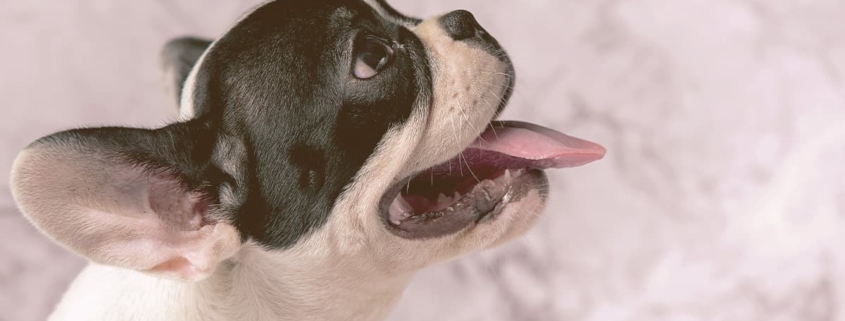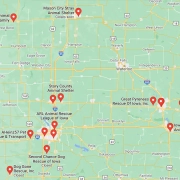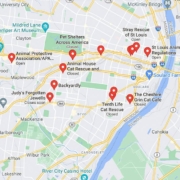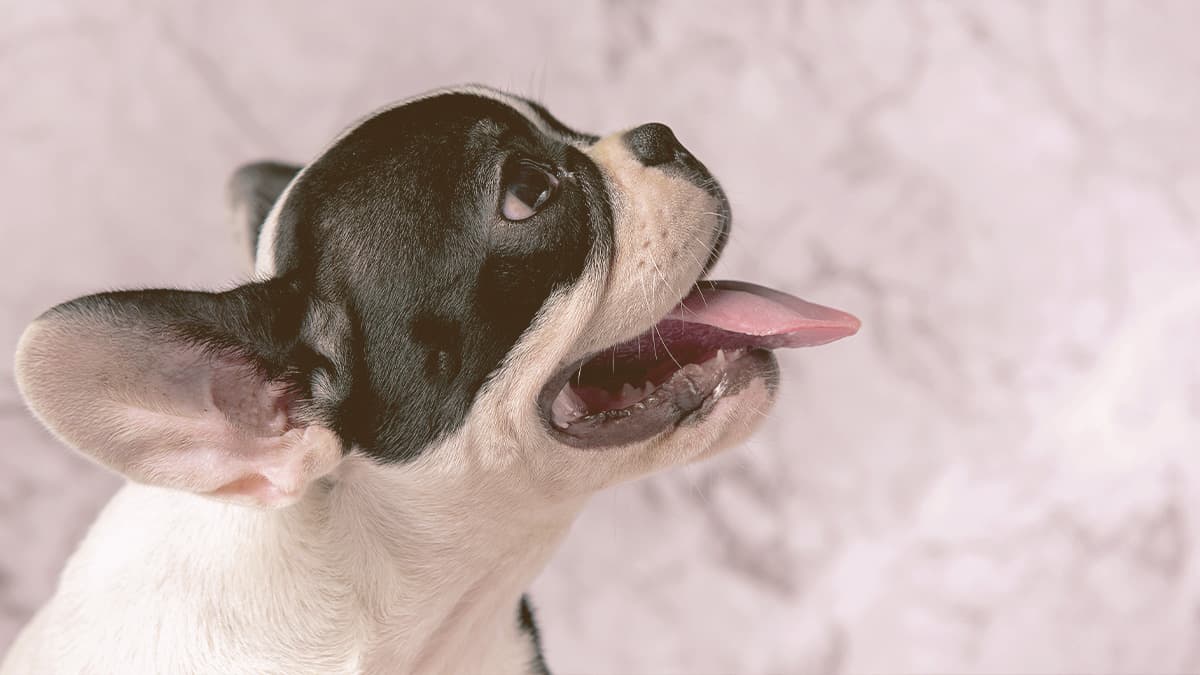
How to Train a French Bulldog Not to Bite?
Alex Vicente • Updated on August 22, 2023
- This review contains affiliate links. Read more here.
- Not a substitute for professional veterinary help.
Having a dog around is a messy business, with their endless biting and chewing.
They might be man’s best friend, but living with one certainly needs some getting used to.
Even though Frenchies aren’t as aggressive as most dogs, they still can get up to no good.
Plus, biting is normal dog behavior; it’s hard to find a dog that doesn’t bite.
With that said, having your Frenchie treat you like a chew toy isn’t what you want from this companionship.
So, we’re here to help you by explaining how to train a French bulldog not to bite.
Let’s begin.
Table of Contents
How to Train a French Bulldog Not to Bite

Understanding what makes a Frenchie bite helps you better understand where they’re coming from.
As a result, you’ll be able to know how to train your French bulldog not to bite.
More on that below, but first, here are a few proven methods that you can follow to help your puppy unlearn this nasty habit.
Bite Inhibition
Bite inhibition is a necessary lesson every dog should learn.
They obtain it naturally when playing with other dogs.
Once a French bulldog bites one of its kind too hard, the injured dog will cry or squeal, causing the Frenchie to realize what it has done.
Your puppy will know how to playfully bite their littermates next time.
In extreme cases, the bitten dog will leave and that’s basically dog lingo for ‘you’ve crossed a line.’
Show Not Tell
Following in the footsteps of bite inhibition, if your Frenchie is keen on biting you, then show them that they shouldn’t do it anymore.
It’s better to cry out like a hurt puppy than shout or yell at your dog for harming you.
Your French bulldog will definitely be alarmed by your reaction at first so they’ll start to back off.
As long as you’re not encouraging them to bite you, your puppy is smart enough to realize that causing you harm is bad.
Walk Away If Necessary
Speak your Frenchie’s language and walk away from them when their aggression gets out of hand.
Even if it’s during playtime, their overexcited behavior will push them to bark loudly and bite you.
So, tell them off, get up, and leave.
Allow your puppy time to cool down and show dominance by letting them know that they’re behaving incorrectly.
You may also want to read:
How to Train a French Bulldog: Quick & Easy Tips
Why Does a French Bulldog Bite?

Dogs are naturally born to bite.
These animals are nature’s best explorers, and so they love learning about the world around them using their noses, mouths, and paws.
French bulldogs are no different, although they’re less aggressive than most dog breeds.
Their biting stages are often limited to young age. When they’re puppies, Frenchies would bite on furniture because they’re teething.
If their owners leave them be, this habit will then carry on to a French bulldog’s adulthood.
As such, it now assumes that biting is an okay thing to do.
That’s why a puppy’s biting inclinations should be handled as early as possible.
If left unaddressed, a Frenchie’s teeth will become a real problem.
Plus, it’s harder for dogs to unlearn their biting tendency as they grow older.
What Triggers a French Bulldog to Bite?
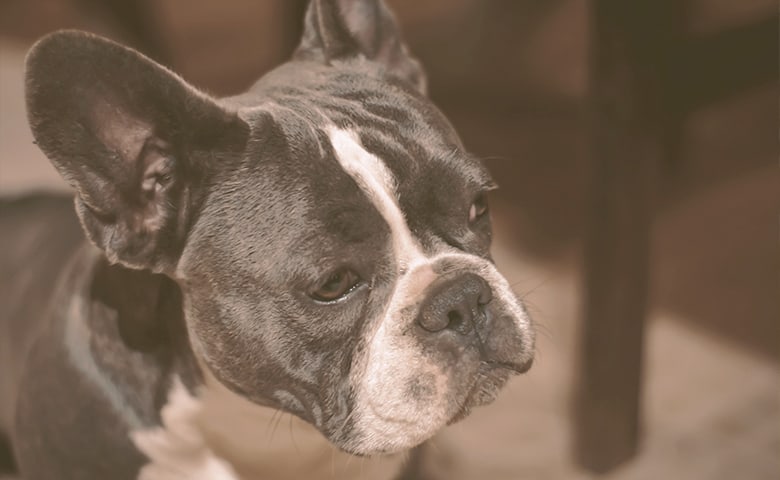
The reasons behind why a French bulldog bites can either be natural, as explained in the previous section or circumstantial.
The latter is what we’ll attempt to tackle below.
For starters, not everyone gets their dog at a young age.
Often, the case is that we end up with an adult Frenchie who was never taught that biting was bad.
That’s why it’s important to know what external reasons might trigger your Frenchie to go into a biting fit.
Here are some of the most common external reasons to keep in mind:
Separation Anxiety
French bulldogs dealing with new owners or homes will show signs of separation anxiety.
A Frenchie will be aggressive to everyone, including its caretaker, and will continuously bite and bark.
In such cases, it’s best to reassure them of your presence and take the time to get them used to you.
Slowly, your Frenchie will familiarize itself with you and stop its biting.
PTSD
Any dog is prone to have gone through a traumatic experience one way or another.
If you have a rescue Frenchie, then you may find them whining and barking at nothing.
In self-defense, they’ll bite everyone and everything they see as a threat.
PTSD is not easily managed in dogs. It’s often accompanied by other psychological illnesses too.
This issue is best handled with the help of a vet.
Stress or Fear
Fear in French bulldogs can be a result of past abuse or of surrounding threats.
This emotion goes hand in hand with stress, and a stressed Frenchie won’t stop biting to calm itself down.
If your dog’s environment is unsafe, they’ll feel in danger and would signal for your help by being aggressive and biting you.
Another case would be that your Frenchie may feel stressed and uncomfortable being around other dogs and will start biting them too.
Overexcitement
The best-case scenario for a French bulldog’s excessive biting is that they’re just overly enthusiastic about playing with you or with other dogs.
Since they’re still dogs being dogs, playtime may get pretty heated.
That’s why it’s recommended to put a lid on things if they get out of hand.
Pull away the bitten dog and let your puppy know they’ve done wrong.
If you happen to be the victim instead, leave the room, indicating to your Frenchie that biting you equals no fun time.
Final Say

It’ll require some work, but educating yourself on how to train a French bulldog not to bite is worth it in the long haul.
Frenchies are just as intelligent as any other dog, so they’ll definitely pick up on their training fast.
Just make sure to be patient with your Frenchie while it’s learning. Yelling and shouting isn’t the way to go about it.
Teach your puppy why it’s wrong to bite and provide them with alternatives, such as chew toys.
The important thing is to keep them happy!
You may also want to read:
How Much Do French Bulldogs Cost? Price Guide 2026

